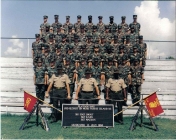Specialty Summary. Supervises and performs as Communications-Computer Systems (C-CS) analysts, coders, testers and managers in the design, development, maintenance, testing, configuration management, and documentation of application software systems, client-server, and web-enabled software and relational database systems critical to war-fighting and intelligence capabilities.
Duties and Responsibilities:
Develops standardized tools and interfaces in accordance with Air Force Network Operations (AFNETOPS) guidance to transform raw data into actionable C2 information. Develops and implements policy to enable effective information discovery, indexing, storage, life-cycle management, retrieval, and sharing in a collaborative enterprise information environment. Harnesses capabilities of systems designed to collect, store, retrieve, process and display data to ensure information dominance.
Ensures compliance with DoD directives and standards for security and interoperability. Protects operating systems, application software, files, and databases from unauthorized access to sensitive information, or misuse of communication-computer resources.
Determines, analyzes, and develops requirements for software systems through interpreting standards, specifications, and user needs as a system analyst. Determines, designs, and develops data requirements, database structure, process flow, systematic procedures, algorithms, and file structures to implement and maintain software systems using software engineering techniques. Works with systems using software methodologies such as distributed processing, systems networking, advanced information storage and retrieval, and management techniques. Determines and recommends the most reasonable approach in designing new systems or modifying existing systems. Develops and maintains system specifications. Conducts and participates in system reviews and technical interchanges. Selects appropriate software development tools. Explores commercial off-the-shelf options to satisfy user requirements.
Translates system specifications and requirements into program code and database structures, implements designed functionality as software coders. Analyzes output products and debugs source code to isolate and correct errors in program logic, syntax, and data entry, and to ensure accuracy and efficiency. Conducts code reviews and unit-level testing. Develops and maintains unit-level test plans. Arranges test data and routines. Modifies existing programs to correct program errors or modifies existing functionality or interface. Prepares system graphical descriptions, standard language statements, workload data, and present and proposed cost. Develops and maintains documentation such as program maintenance manuals and operational guides.
Designs, develops, maintains, and executes test plans for formal qualification testing, system integration testing, regression testing and verification, validation and acceptance testing as software testers. Conducts test events. Analyzes software system requirement documents. Develops and maintains test data. Performs analysis of test data, determines test results and develops test reports. Makes recommendations to release authorities concerning verifiability, validity, conformance, and interoperability of software systems.
Designs, develops, maintains, and executes processes to manage software or database components, specifications, test plans, procedures and results, and revision history applicable to a software system to ensure systems in use meet user requirements as software configuration managers. Controls software components at all times to ensure availability and stability of documented baselines. Prepares and manages processes for reporting deficiencies and requesting changes to software components or systems. Manages change packages through analysis and development efforts ensuring testing is performed and documentation is created or updated as required. Conducts reviews of proposed change packages by the user community and control authorities. Prioritizes deficiency reports and change requests using guidance from the user community and control authorities. Prepares and maintains software system baseline documentation and procedures. Prepares, packages, and documents deliverable products.
As software project manager, interacts with and provides oversight for software system developers and maintainers. Develops and prepares system requirements and proposals. Analyzes requests for information. Prepares documentation of proposal specifications and programs. Organizes system study teams and conducts briefings. Conducts and participates in design reviews and technical interchanges between developers and user representatives. Plans, conducts and reports on the results of system acceptance tests. Manages or participates in the contract management, software quality assurance, or quality assurance evaluation process.
Specialty Qualifications:
Knowledge. Knowledge is mandatory of system capabilities, limitations, and programming logic; techniques and procedures of systems analysis and design; related information processing devices and systems; C-CS; software methodologies; methods of editing input and output data; configuration management techniques; security practices; customer relations; application of mathematical and analytical concepts to process problems within a C-CS; and computer program editing and testing techniques.
Education. For entry into this specialty, completion of high school with courses in algebra, geometry, computer science and computer programming is desirable.
Training. The following training is mandatory for award of the AFSC indicated:
3C032. Completion of a basic C-CS software programming course.
3C072. Completion of the advanced C-CS software programming course.
Experience. The following experience is mandatory for award of the AFSC indicated:
3C052. Qualification in and possession of AFSC 3C032. Experience performing programming functions such as designing, coding, testing, or documenting software.
3C072. Qualification in and possession of AFSC 3C052. Experience performing or supervising one of the functions of programming, such as preparing system requirements, developing high-level or detailed designs, translating designs into code, testing, configuration management, or project management.
Other. The following are mandatory as indicated: A minimum score of 71 on the Air Force Electronic Data Processing Test. For award and retention of these AFSCs, individuals must maintain eligibility to deploy and mobilize worldwide. Specialty requires routine access to Top Secret material or similar environment. For award and retention of AFSCs 3C0X2, completion of a current Single Scope Background Investigation (SSBI) according to AFI 31-501, Personnel Security Program Management. NOTE: Award of the 3-skill level without a completed SSBI is authorized provided an interim Top Secret clearance has been granted according to AFI 31-50.




